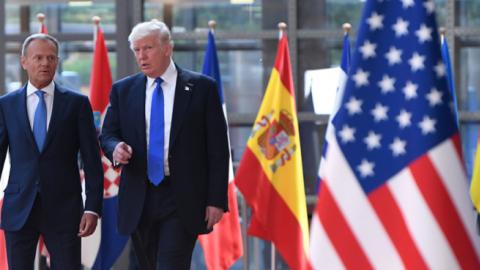“Why does he hate us?” is the question American foreign-policy types often hear from European friends and colleagues when the subject of Donald Trump comes up—as it often does. With Mr. Trump and Secretary of State Mike Pompeo in Europe this week, it seems an auspicious time to attempt an answer.
The news isn’t all bad. When Mr. Trump and senior administration officials talk about China, they attack it for abusing the international system in a ruthless quest for global hegemony. Their reading of Europe is different: that a mix of dysfunctional policies, unrealistic ideas about world politics, and poor institutional arrangements has locked the Continent on a trajectory of decline. As Mr. Trump’s team sees it, they aren’t trying to weaken Europe; they are trying to save Europe from itself.
There are five elements of the Trump critique of the European Union. First, some of the “new nationalists” believe multinational entities like the EU are much weaker and less effective than the governments of nation-states—so much so that the development of the EU has weakened the Western alliance as a whole. In this view, cooperation between nation-states is good and through it countries can achieve things they couldn’t achieve on their own. But trying to overinstitutionalize that cooperation is a mistake. The resulting bureaucratic structures and Byzantine politics and decision-making processes paralyze policy, alienate public opinion, and create a whole significantly less than the sum of its parts.
Read the full article in the Wall Street Journal "here":https://www.wsj.com/articles/trumps-case-against-europe-11559602940


















